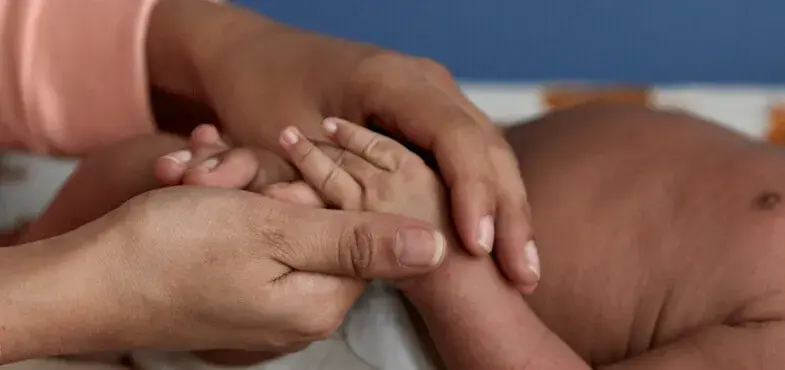Newborn Skin Conditions
Your new baby’s skin is still developing, so it needs special care. As their skin adapts to their new world, many newborns experience common skin conditions.
Your newborn’s skin must adapt from the water-like environment of your womb to the drier environment after birth. The transition isn’t immediate, and your baby’s skin will continue to develop long after birth, which makes their skin more delicate than yours. Although baby’s skin can absorb moisture at a faster rate than adult skin, it can lose it faster, too — leaving your baby’s skin prone to dryness. In addition, your baby’s immune system is still developing, so there’s also a greater potential for infection.
Baby Acne
Small white pimples or spots called milia usually appear on the face, especially the nose and chin. They aren't itchy and won't bother your baby. They are just the result of immature sweat glands, and possibly hormones from your pregnancy, and will disappear without treatment.
Although most baby acne is selflimiting and resolves on its own, if your baby’s condition is severe or you have concerns, be sure to talk to your healthcare professional.
Skin Peeling
You may also notice during the first few days that your newborn's skin peels slightly, especially on the palms of their hands, soles of their feet and their ankles. This is perfectly normal, especially if your baby was born past their due date. After a few days the peeling will go away. Apply a moisturiser made for babies to help keep baby's skin hydrated.
Cradle Cap
Some babies have cradle cap or seborrhoeic dermatitis — a skin condition that looks like crusty or scaly patches on the scalp or eyebrows. This is a very common condition that may begin in the first few weeks and usually lasts several weeks or months. Fortunately, it usually resolves completely when your baby is between eight and 12 months old.
To help alleviate cradle cap, you can gently massage a moisturiser or oil like JOHNSON'S® CottontouchTM Hair & Scalp Oil onto the patches to soften the crust. Wait a few minutes, then comb gently to remove the flakes. Then you can shampoo with a gentle made-for-babies shampoo like JOHNSON'S® Baby Shampoo. In severe cases or if you are worried in any way, talk to your doctor. A specialist medicine may be needed in some cases.
Remember to be extra gentle when massaging or washing around the fontanels, or soft spots, on your baby's head.
Read more about cradle cap and its treatment here
Nappy Rash
Many babies experience nappy rash at some point. For information on nappy rash care and protection, visit our nappy rash guide.
Eczema & Dry Skin
Eczema, or atopic dermatitis, is a dry, itchy skin condition that affects up to one in five children, particularly those with a family history of skin irritations, asthma or allergies. It usually appears for the first time between the ages of 2 months and two years old. Most children who have eczema will grow out of it by the time they are in their teens.
In babies, eczema often appears as patches of red, dry and itchy skin on the face or behind the ears, and in the creases of the neck, knees and elbows but may spread to other areas. You should definitely talk to your baby’s doctor about treatment if the condition is severe, but here are some tips for dealing with eczema, as well as extremely dry or sensitive skin:
Avoid the things you think may cause itching, such as dust, grass, weeds, wool clothing and certain soaps, detergents, fabric softeners and perfumes. It may help to keep a diary to determine the cause.
Give your baby short baths - no more than 5-10 minutes - in water that is warm, not hot. You may want to add a specially formulated oil to the bathwater.
Use mild skin cleansers or shampoos specially made for babies with sensitive skin. Be extra careful on areas often exposed to the environment.
Dry the skin after a bath by patting with a soft towel, and then immediately apply moisturiser. Do not rub the skin.
Moisturise frequently throughout the day, especially after bathing.
Use an emollient cream, smoothing it into the skin in a downward motion.
Although eczema can be an irritating condition, especially during periods of flare-ups, by following these tips, you can help to make your baby more comfortable.
For more information, please visit babycentre.co.uk
Even though many of these conditions resolve themselves, if you do have any worries or concerns, it’s best to speak to your healthcare professional.
JOHNSON'S®Pioneering Safety and Science in Baby Care
We are committed to working with Parents, Healthcare Professionals and Scientists to ensure our baby products continue to deliver high standards of safety and care.

